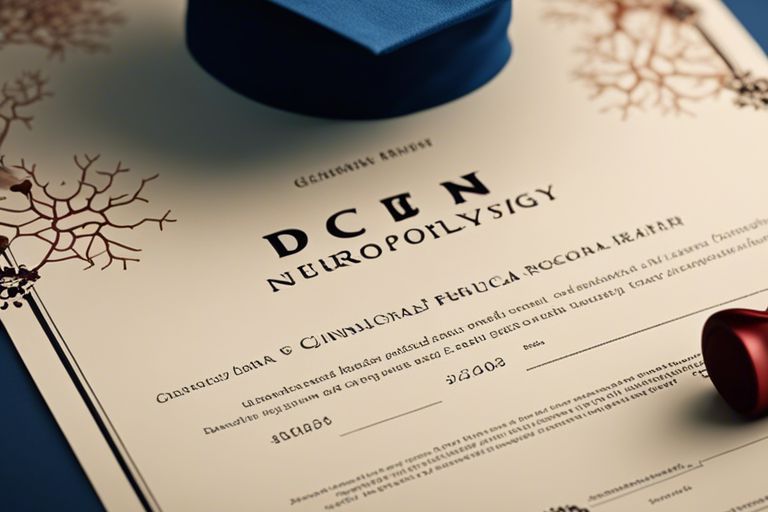Most aspiring neuropsychologists aiming for a career in clinical practice and research strive to attain the prestigious Doctorate of Clinical Neuropsychology (DCN). This advanced degree equips professionals with the expertise and skills necessary to assess, diagnose, and treat individuals with neurocognitive disorders. Learn about the rigorous journey and rewarding opportunities that come with pursuing a DCN in this informative guide.
Key Takeaways:
- Specialized Training: Doctorate of Clinical Neuropsychology (DCN) provides specialized training in the assessment and treatment of brain-related disorders.
- Research Opportunities: Students pursuing a DCN have the opportunity to engage in research projects and contribute to advancements in the field of neuropsychology.
- High Demand for Professionals: Graduates with a DCN are in high demand, especially in healthcare settings, rehabilitation centers, and academic institutions.

Overview of Clinical Neuropsychology
Definition and Scope
For a clear understanding, Clinical Neuropsychology is a specialized field that focuses on the relationship between the brain and behavior. It involves assessing and treating individuals with various neurological conditions to better understand their cognitive abilities and emotional functioning.
Importance and Applications
On a broader scale, Clinical Neuropsychology plays a crucial role in diagnosing and treating individuals with brain injuries, strokes, dementia, and other cognitive disorders. It helps in developing effective rehabilitation plans and improving overall quality of life for patients.
Understanding the implications of brain-behavior relationships is necessary for enhancing assessment tools, designing treatment interventions, and advancing research in the field of Clinical Neuropsychology. By studying how cognitive processes are affected by brain dysfunctions, professionals can contribute to the development of effective interventions for various neurological conditions.
The Path to Earning a Doctorate in Clinical Neuropsychology
Educational Prerequisites
It is vital to have a strong foundation in psychology and neuroscience to pursue a Doctorate in Clinical Neuropsychology. Most programs require a bachelor’s degree in psychology or a related field, along with coursework in biology, statistics, and research methods.
Core Curriculum and Specializations
Earning a Doctorate in Clinical Neuropsychology involves completing a core curriculum that covers topics such as neuropsychological assessment, brain-behavior relationships, and psychopathology. Students may also have the opportunity to specialize in areas like pediatric neuropsychology, geriatric neuropsychology, or forensic neuropsychology.
To specialize in a particular area, students may be required to complete additional coursework, clinical rotations, and research projects focused on that area of interest.

Key Skills and Competencies in Clinical Neuropsychology
Once again, the field of clinical neuropsychology requires a specific set of skills and competencies to excel in the assessment, diagnosis, and treatment of patients with neurological conditions.
Diagnostic Assessment
Assessment is a crucial component of clinical neuropsychology, involving the administration and interpretation of neurocognitive tests to evaluate various cognitive functions, such as memory, attention, and executive functioning.
Therapeutic Interventions
Assessment of therapeutic interventions involves developing individualized treatment plans that may include cognitive rehabilitation, psychotherapy, and pharmacological management to address cognitive and emotional functioning in patients with neurological disorders.
Another important aspect of therapeutic interventions in clinical neuropsychology is providing support and guidance to patients and their families throughout the treatment process, helping them cope with the challenges associated with neurological conditions and promoting overall wellness and quality of life.

Career Opportunities and Advancements
Clinical Settings
For those pursuing a Doctorate of Clinical Neuropsychology (DCN), there are various career opportunities in clinical settings. Graduates can work in hospitals, rehabilitation centers, private practices, and mental health facilities, providing assessment and treatment for patients with neurological disorders.
Research and Academic Roles
Settings in research and academia are also available for DCN graduates. They can work in universities, research institutions, and healthcare organizations, conducting cutting-edge research on brain-behavior relationships, teaching future neuropsychologists, and contributing to the advancement of knowledge in the field.
Plus, those interested in this area can pursue postdoctoral fellowships to gain additional specialized training and experience, leading to leadership positions in research, academia, or clinical practice.
To wrap up
Conclusively, obtaining a Doctorate of Clinical Neuropsychology (DCN) is a rigorous yet rewarding journey that prepares individuals to specialize in the assessment and treatment of neurological disorders. With a strong foundation in psychology and neuroscience, graduates of this program are equipped to make significant contributions to the field of neuropsychology through research, clinical practice, and advocacy.
FAQ
Q: What is Doctorate of Clinical Neuropsychology (DCN)?
A: Doctorate of Clinical Neuropsychology (DCN) is a terminal degree program designed to train psychologists in the specialized field of clinical neuropsychology. It focuses on the relationship between the brain and behavior, emphasizing assessment, diagnosis, and treatment of neurological disorders.
Q: What does a Doctorate of Clinical Neuropsychology program involve?
A: A Doctorate of Clinical Neuropsychology program typically includes coursework in brain anatomy and function, cognitive assessment, neuropsychological testing, psychopathology, and clinical interventions. Students also engage in practicum experiences to apply their knowledge in real-world settings.
Q: What career opportunities are available for graduates of a DCN program?
A: Graduates of Doctorate of Clinical Neuropsychology programs can pursue careers as clinical neuropsychologists in hospitals, rehabilitation centers, private practices, research institutions, and academia. They may assess and treat patients with brain injuries, neurodevelopmental disorders, dementia, strokes, and other neurological conditions.

